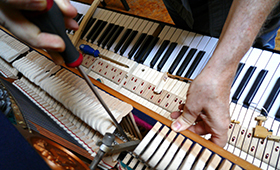Perfection delivers the “perfect” sound
Training for piano and harpsichord makers updated
26/2017 | Bonn, 18.07.2017

This is an occupation for perfectionists. Even the smallest deviations in woodworking may distort the sound of a piano or harpsichord. This traditional occupation has been updated due to new training content which, amongst other things, is to place greater focus on self-employment. On behalf of the Federal Government, and together with social partners and experts from company practice, the Federal Institute for Vocational Education and Training (BIBB) has now brought vocational training for piano and harpsichord makers up to date. The new regulation enters into force on 1 August.
In addition to manual instrument making, the training places particular emphasis on conveying competencies for the repair of instruments and for the costing of repair work. Important training content also includes conducting customer conversations independently and customer support. One new vocational aspect contained in the updated regulation is the encouragement of entrepreneurial thinking and behaviour. The aim here is to deliver an understanding of the prospects, requirements, general conditions, opportunities and risks relating to self-employment.
The making of keyboard instruments has always combined an understanding of how to work with nature, of traditional skilled crafts, and of innovative technology. Piano and harpsichord makers must have extremely good hearing, great sensitivity and dexterity. They should be able to play the piano or harpsichord themselves in order to be able to check and tune the sound quality of the finished instrument. Grand pianos, pianos and harpsichords are composed of around 10,000 individual elements made from wood, steel, brass and leather. Woods used in the production process are dried for 2 years in a specialist storage area and it can take up to a year to make a grand piano.
The three-and-a-half-year training ends with a journeyman examination set by the Chamber of Crafts and Trades or a final examination set by the Chamber of Industry and Commerce. Piano and harpsichord makers work mainly in skilled craft and industrial piano making businesses, but also in museums with restoration departments for musical instruments, or as piano tuners. The training also opens up opportunities for advancement and career progression, for example as master craftsman in piano and harpsichord making.
The updating of the training regulation means the previous regulation, which was over 35 years old, has now been replaced. The skeleton curriculum for the vocational school which is aligned with the training regulation has been revised by the Standing Conference of the Ministers of Education and Cultural Affairs in parallel with the updating of the training regulation.
Contact partner:
Margareta Pfeifer
Specimen copy requested if printed.